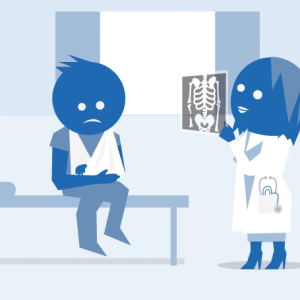Post-Corona Predictions, Vol. 1
I am sure that you also wonder how the world will be different on the other side of the Corona-crisis? That’s a big question with thousands of aspects to consider. My first prediction is about how we will fund our healthcare systems in the future.

Anne Sophia Hermansen, the cultural editor at the Danish newspaper Berlingske Tidende, recently wrote an excellent OpEd explaining that most people who predict the time after the Corona crisis look more in the mirror than in the crystal ball. What they see is the same ideal image of society that they already had before the crisis. We are all convinced that the crisis will make others share our viewpoints, attitudes, feelings and prejudices.
I think she is right.
We all look for reasons to justify our preconceived view of the world. I may also be a victim of this sort of confirmation bias. You have been warned.
We were warned, yet unprepared
In April 2015 and in just under 9 minutes, no one less than Bill Gates, Microsoft’s founder, explained exactly the threat scenario we are now in the middle of.
In just under nine minutes, he also explained what we needed to do to prepare ourselves. Nothing, of what he recommended, has happened. No governments took initiatives. Nor did any of the top executives, who we as shareholders pay millions to each month, bring our businesses safely through.
No one did anything.
All right, even though it only takes nine minutes to understand the danger, it’s also more than most people will invest in something that might happen someday. In addition, the practical implementation of the measures, if taken seriously, would be extremely complicated to devise and implement.
This time, we were fortunate that the outbreak started in China, which even with a hesitant start and some foot-dragging eventually shared the information with the rest of the world and shut down their communities. What happens if a similar outbreak starts in a country where the authorities do not have the infrastructure to detect it early enough and get it contained? Imagine if the outbreak happened in Syria or Chad, the last one a country with 16 million people and 0.05 doctors per 1,000 inhabitants (in Denmark we have 4.46 doctors per 1,000 inhabitants).

Can we expect a rapid upgrading of the health systems in all poor countries on the other side of the corona crisis? In a virus context, it would be in our interest to contribute to the project, but will it happen?
Probably not.
Although we would like to see it happen and, in theory, be willing to devote the financial resources (which we are not), the local cultural and political infrastructures that in practice are there to translate the money into buildings, equipment, manpower, knowledge and functioning organisations, are often not present. Add to that the geopolitical interests of the great powers, they rarely come together for a better world.
More universal healthcare systems

My first prediction is that more people will be in favour of tax-funded national healthcare systems such as those we have across Europe.
When the Corona-crisis broke, lots of people lost their jobs. In a system based on private insurance, that left many people without access to healthcare. They lost their employer-sponsored insurance and, now out of work, they couldn’t afford to pay for a private policy.
Where I live, Denmark, that was never an issue. We have a public and universal healthcare system funded through taxes and everyone, even tourists visiting, are entitled to “free” healthcare services. I have “free” in quotation marks because, of course, it is not free of cost. But the link between what you as an individual get and what you pay has been removed.
We have had a formalised, universal healthcare service in Denmark since 1870. Over the course of 150 years, we have refined and reorganised the system and we will continue to do so. However, I have yet to meet a single Dane, poor or rich, that doesn’t support healthcare as a common good for everyone. It is one of those institutions that define us as a nation. It’s one of the ways we cover each other’s back when shit happens.








